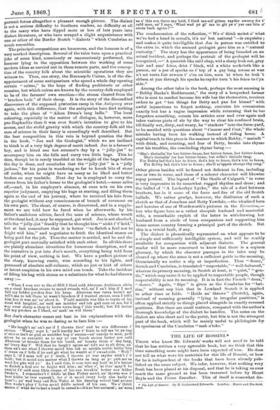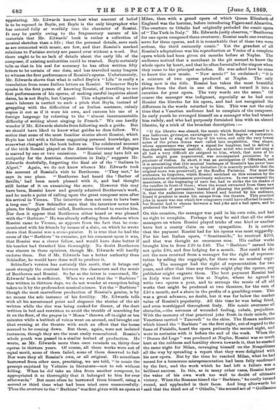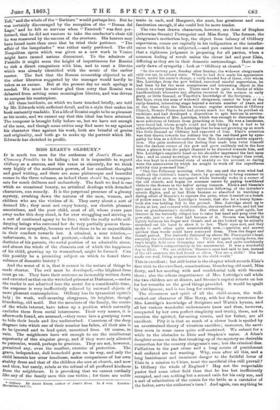THE LIFE OF ROSSINI.*
THOSE who know Mr. Edwards' works will not need to be told that he has written a very agreeable book, but we think that this time something more might have been expected of him. He does not tell us what were his materials for this life of Rossini, or how far he is independent of the books that have been already published on the same subject. We infer, however, that nothing very fresh has been placed at his disposal, and that he is taking us over much the same ground as has been traversed before by Henri Beyle and the Freres Escudier. This of itself is somewhat dis appointing. Mr. Edwards knows best what amount of belief is to be reposed in Beyle, yet Beyle is the only biographer who has entered fully or worthily into the character of Rossini. It may be partly owing to the fragmentary nature of his materials that Mr. Edwards' book is rather a collection of musical sketches than a life ; that the personal details, save such as are connected with music, are few, and that Rossini's marked relations to Parisian society are passed over without a word. But there ought to be no lack of details about the early life of the composer, if existing authorities could be trusted. Beyle certainly tells us that in his zeal for accuracy he has often written fifty letters to be certain of one date, and has travelled many leagues to witness the first performance of Rossini's operas. Unfortunately, Mr. Edwards shows that what is called Beyle's " Life " is really a translation from some Italian letters on Rossini. Whenever Beyle speaks in the first person of knowing Rossini, of travelling to see first performances of his operas, of making careful inquiries about dates, he is not Beyle, but Carpani. This adaptation of another man's labours is carried to such a pitch that Boyle, instead of grappling with the difficulties of an Italian sentence, calmly copies it out as if it were his own, and excuses his use of a foreign language by referring to the " almost insurmountable difficulty of writing about singing in French." We can hardly wonder if Mr. Edwards shrinks from following such a guide. But we should have liked to know what guides he does follow. We notice that some of the most familiar stories about Rossini, which Beyle has told with a fullness suggesting personal knowledge, are somewhat changed in the book before us. The celebrated account of the trick Rossini played on the Austrian Governor of Bologna is marred by one or two omissions. " Rossini may have felt an antipathy for the Austrian domination in Italy," suggests Mr. Edwards doubtfully, forgetting the final air of the " Italiana in Algeri." Again, we do not know whence Mr. Edwards took his account of Rossini's visit to Beethoven. "They met," he says in one place. " Beethoven had heard the Barber of Seville,' had been much pleased with it, and had thought still better of it on examining the score. However this may have been, Rossini knew and greatly admired Beethoven's work, and he made a point of calling upon the great composer soon after his arrival in Vienna. The interview does not seem to have been a long one." Now Schindler says that the interview never took place, for though Rossini called, Beethoven refused to receive him. Nor does it appear that Beethoven either heard or was pleased with the" Barbiere." He was already suffering from deafness when Rossini came to Vienna, as appears from the fact that he coin.municated with his friends by means of a slate, on which he wrote down that Rossini was a scene-painter. It is true that he had the score of the " Barbiere " to examine, yet his comment upon it was, that Rossini was a clever fellow, and would have done better if his teacher had thrashed him thoroughly. No doubt Beethoven was sincere in these opinions, though Mr. Edwards will hardly endorse them. But if Mr. Edwards has a better authority than Schindler, he would have done well to produce it.
Schindler's version has certainly this merit, that it brings out most strongly the contrast between the characters and the music of Beethoven and Rossini. So far as the latter is concerned, Mr Edwards' book is sufficient. When we read that the " Barbiere was written in thirteen days, we do not wonder at exception being taken to it by the profoundest musical science. Yet the " Barbiere " though the most marvellous production of Rossini's genius, is by no means the sole instance of his fertility. Mr. Edwards tells with all his accustomed point and elegance the stories of the air written while the rice was being cooked for dinner, of the duet written in bed and rewritten to avoid the trouble of searching for it on the floor, of the prayer in " Moses " thrown off in eight or ten minutes while a hubbub of voices went on around, and brought out that evening at the theatre with such an effect that the house seemed to be coming down. But these, again, were not isolated instances, though they are the most easily remembered. Rossini's whole youth was passed in a similar hotbed of production. He wrote, as Mr. Edwards more than once reminds us, thirty-four operas in thirteen years. Of course, all these works were not of equal merit, some of them failed, some of them deserved to fail. Nor were they all Rossini's own, or all original. He sometimes borrowed from other men, practising, we are told, " in music the precept enjoined by Voltaire in literature—not to rob without killing. When he did take an idea from another composer, he appropriated it so thoroughly that it belonged to him for ever afterwards." But more often he borrowed from himself, using a second or third time what had been tried once unsuccessfully. Thus the overture to the " Barbiere" was first given with an opera at
Milan, then with a grand opera of which Queen Elizabeth of England was the heroine, before introducing Figaro and Almaviva. The overture to Othello had originally preluded the comic opera of " The Turk in Italy." Mr. Edwards justly observes, " Beethoven for one opera composed three overtures ; Rossini made one overture serve for three operas, and it is remarkable that of these two were serious, the third eminently comic." Yet the grandest of all Rossini's adaptations was his reproduction at Venice of a complete opera which had been given six months before at Naples. The audience noticed that a merchant in the pit seemed to know the whole opera by heart, and that he often forestalled the singers when they came to the principal melodies. He was asked how he came to know the new music. " New music?" he exclaimed ; "it is a mixture of two operas produced at Naples. The only thing new is the title. Rossini has taken the moat beautiful phrase from the duet in one of them, and turned it into a cavatina for your opera. The very words are the same." Of course the manager was indignant, especially as he had sent Rossini the libretto for his opera, and had not recognized the difference in the words returded to him. This was not the only time that a Venetian audience had to complain of the composer. In early youth he revenged himself on a manager who had treated him rudely, and who had purposely furnished him with an absurd libretto, by a trick of the broadest description
"If the libretto was absurd, the music which Rossini composed to it was ludicrous, grotesque, extravagant to the last degree of caricature. The bass had to sing at the top of his voice, and only the very lowest notes of the prima donna were called into requisition. One singer, whose appearance was always a signal for laughter, had to deliver a fine-drawn sentimental melody. Another artist who could net sing at all had a very difficult air assigned to him, which, that none of his faults might pass unperceived, was accompanied pianissimo by a pizzicato of violins. In short, it was an anticipation of Offenbach, and it is astonishing that this musical burlesque of Rossini's has never been reproduced substantially, or by imitation (it is scarcely probable that the original score was preserved), at the Bouffes Parisiens. Nor must the orchestra be forgotten, which Rossini enriched on this occasion by the introduction of instruments previously unknown. In one movement the musicians, at the beginning of each bar, had to strike the tin shades of the candles in front of them; when the sound extracted from these new ' instruments of percussion,' instead of pleasing the public, so irritated it, that the audacious innovator, hissed and hooted by his audience, found it prudent to make his escape from the theatre. This practical joke in music was one which few composers could have afforded to make ; but Rossini had to choose between a bad joke and a bad opera, and he preferred the former."
On this occasion, the manager was paid in his own coin, and had no right to complain. Perhaps it may be said that all the other managers on whom Rossini played tricks of one kind or another have but a scanty claim on our sympathies. It is certain that the payment Rossini had for his operas was most niggardly. For his last Italian opera, " Semiramide," he received £200, and that was thought an enormous sum. His earlier works brought him in from £20 to £40. The " Barbiere " earned him not quite £80, and free lodging for a month. Nor could he eke out the sum received from a manager for the right of representation by selling the copyright, for there was no musical copyright. The manager had the right of representation for two years, and after that time any theatre might play the operas, any publisher might engrave them. The best payment Rossini had in Italy was that given him at Naples, where he agreed to write two operas a year, and to arrange the music of all old works that might be produced at two theatres, for the sum of £40 a month, and a share in the profits of a gambling-room. This was a great advance, no doubt, but it was far below the market value of Rossini's popularity. All this time he was being feted, and even worshipped throughout Italy. His music overcame all obstacles,—the soreness of wounded feeling, cabals, prejudices. With the memory of that practical joke fresh in their minds, the Venetians carried " Tancredi " to the skies. The Roman audience which hissed the " Barbiere " on the first night, out of regard to the fame of Paisiello, heard the opera patiently the second night, and were in ecstacies with it before the end of the week. When the "Donna del Lego" was produced at Naples, Rossini was so much hurt at the coldness and hostility shown towards it, that he started the same night for Milan, revenging himself on the Neapolitans all the way by spreading a report that they were delighted with his new opera. But by the time he reached Milan, what he had meant for a humorous misrepresentation had been fully confirmed by the fact, and the work which he had left a failure was a brilliant success. In this, as in many other cases, Rossini knew the value of his own work too well to doubt of ultimate victory. When the Romans hissed the " Barbiere," he coolly turned round, and applauded in their faces. And long afterwards he said that the third act of " Othello," the second act of " Guillaume
Tell," and the whole of the " Barbiere " would perhaps live. But he was certainly discouraged by the reception of the " Donna del 14E0," and he felt so nervous when " Tancredi" was first performed, that he did not venture to take the conductor's chair till he was reassured by the success of the overture. His hearers may have found more than once that he tried their patience. " The affair of the lampshades " was rather easily pardoned. The old Neapolitan opera which was given as a new work in Venice might have caused serious discontent. To the admirers of Paisiello it might mein the height of impertinence for Rossini to risk a direct comparison with him, and to reset a libretto which was already identified with the music of the earlier master. The fact that the Roman censorship objected to all the other librettos suggested by the manager would hardly be taken as an excuse. But at the present day no such apology is needed. We must be rather glad than sorry that Rossini was debarred from setting some meaningless libretto, and was driven to compose his masterpiece.
All these incidents, on which we have touched briefly, are told by Mr. Edwards with sufficient detail, and in a style that makes his book eminently readable. Yet a life of Rossini ought to be as pleasant as his music, and we cannot say that this ideal has been attained. The composer is brought fully before us, but we have not enough of the man, and though some critics may find more to say against his character than against his work, both are brimful of genius and originality, and both go to make up the portrait which Mr. Edwards has sketched in profile.
































 Previous page
Previous page